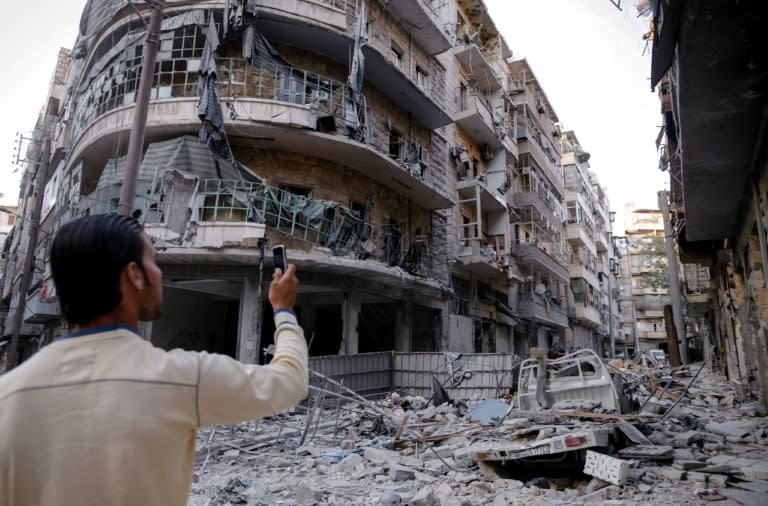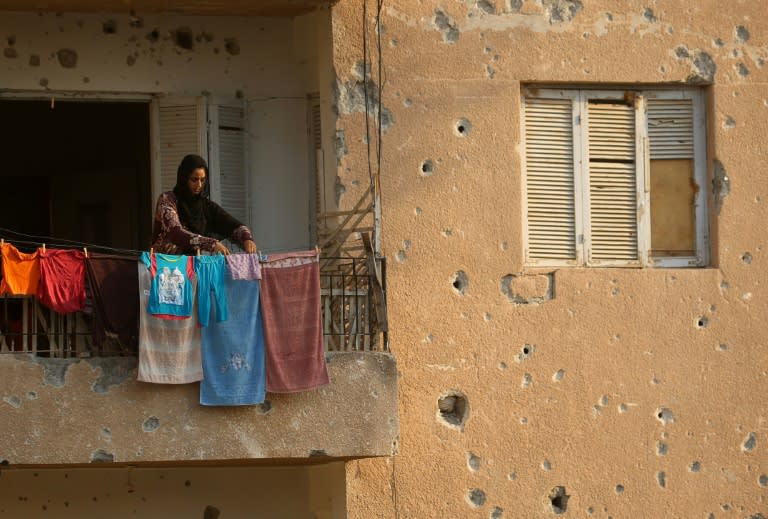After filming IS horrors, Raqa activists become war reporters
They honed their media skills secretly filming Islamic State group beheadings in Raqa. Now, these Syrian activists have become impromptu war reporters, covering the US-backed assault on their city from the ground. "If the crack is sharp and the column of smoke goes straight up, it's an air strike," Syrian activist Tim Ramadan tells AFP from Raqa, using a pseudonym and communicating through a Facebook profile that disguises his identity. Every night, Ramadan discreetly turns on his internet satellite service, uploads his daily records from the battle-torn city to Europe-based colleagues at the "Sound and Picture" collective, then immediately deletes the messages. Media networks including Sound and Picture are providing a rare window into life in Raqa, ravaged by fighting since the US-backed Syrian Democratic Forces broke into the city on June 6. They write stories on what it's like for civilians to scavenge for food and water, publish footage of air strikes, and commemorate civilians killed in fighting. "This is the only thing I can do right now -- keep track of how many air strikes, shells, dead, wounded. Who was killed by a sniper, an air strike, or a mine. How many houses were destroyed," Ramadan says. Activists like him once solely focused on documenting the gruesome atrocities of IS's three-year-reign over the city. But the assault on Raqa changed all that. "We used to be afraid of being arrested (by IS) if we went out in the street. Now we're afraid of going outside in case an artillery shell hits us. And if we don't go out, we're scared an air strike could flatten the whole house on top of us," says Ramadan. US-led coalition warplanes and SDF shelling have pounded Raqa, where up to 25,000 civilians still live after tens of thousands escaped. The SDF has captured around 65 percent of Raqa, recently overrunning the strategic Old City. "When the coalition and the SDF entered the scene, we had to document more. Daesh wasn't the only side killing civilians anymore," Ramadan says, using the Arabic acronym for IS. - 'Human shields' - Since Syria's uprising began in 2011, citizen journalists have used cell phones and social media to document protests and violations by armed forces. They adapted the same tools to document IS atrocities after it captured Raqa in 2014, with groups like Raqqa is Being Slaughtered Silently publishing footage of beheadings and jihadist patrols. When coalition air strikes on Raqa began in 2014, the city's activists started to document those too. But the activists say the real change in their work came when the SDF entered the city, prompting clashes that brought rampant power cuts and made moving around much more difficult. "IS has actually lifted some of its restrictions on people because it's busy with clashes," says 21-year-old Mazen Hassoun, who manages news outlet Raqqa Post from Germany. "But communicating with our team is harder now than before, especially after the internet cafes were shut and fighting reached the city itself," he says. Like other activists, Raqqa Post's team stockpiled food, water, and medicine and turned basements into makeshift bomb shelters in anticipation of a long fight, says Hassoun. Mohammad al-Khaled, who heads the Raqqa24 media collective from northern Syria, warned his correspondents that he had seen how brutally IS responded to other US-backed assaults. "I told them Daesh would be more evil towards civilians, that they would use them and their families as human shields if they stayed," Khaled tells AFP, adding that some chose to flee. - IS leaves, but ideas stay - In recent months, Khaled has begun using new messaging programmes and code words to protect his correspondents. Two members of the network's six-person team have been wounded in clashes, but correspondent Khalil still refuses to leave. "My specialisation with the network is documenting casualties because of my background in medicine. I record the number and cause of deaths," Khalil says, using a pseudonym and communicating via an online messaging app. "If I was to leave at a time like this, it would be a betrayal of my countrymen, whom I've decided to stay with in this situation." Aghiad al-Kheder, who coordinates with Ramadan and other Sound and Picture correspondents from Germany, spent a year living under IS in Raqa before escaping in 2015. At the time, he graffitied anti-IS messages and distributed flyers to combat the jihadists' extreme ideology. These campaigns halted when fighting reached Raqa, but they will be essential after IS is ousted from the city, according to Kheder. "Every person, regardless of gender or age, has seen so many executions that it became normal. Children were taught a curriculum set by Daesh. The men were exposed to toxic thoughts every day," he tells AFP. "This is why rebuilding society and erasing the impact of Daesh is our most important job. Daesh will leave one day, but the ideas that they planted during their stay could remain."




